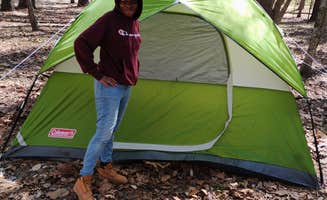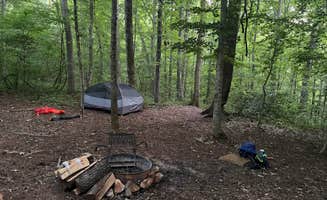Butner Lake Wildlife Management Area provides primitive dispersed camping in the Piedmont region of North Carolina, situated at approximately 400 feet elevation within a mixed hardwood forest ecosystem. This camping area operates under specific seasonal regulations due to its primary function as hunting grounds. Campers should prepare for variable weather conditions typical of central North Carolina, with summer humidity and moderate winter temperatures affecting camping comfort.
What to do
Fishing access: Several small lakes are located within minutes of Butner Lake WMA, making it popular with anglers. "There is a lake 2 mins away one way and another 7 mins away the other way," notes camper Donnelle, who enjoyed extended stays at the campground.
Wildlife observation: The wildlife management area offers opportunities to spot local fauna. One camper described hearing "many coyotes, elks and an owl" during their stay, though animals generally keep their distance from the camping areas. A young fox was the only wildlife one reviewer spotted near their campsite.
Convenient basecamp: The location serves well for travelers passing through the Cary area. "Works perfectly, especially in a pinch," writes Scarlett C., highlighting the area's utility for overnight stays when other options aren't available.
What campers like
Proximity to amenities: Despite being free camping near Cary, North Carolina, Butner Lake WMA offers surprising convenience to urban services. Billy B. notes the campground is "very primitive, but close to town if you need anything," making it practical for extended stays.
Cell service: Several campers mentioned adequate connectivity at this dispersed camping area. "Our Boost mobile wi-fi worked perfectly fine," reports Donnelle, which enables working remotely from this rustic setting.
Seclusion without isolation: The campground provides a balance of privacy and accessibility. Joe F. describes it as having "Right off the road, easy access and perfect sites for 1 car and a tent," making it suitable for solo travelers or small groups seeking no-cost camping options.
What you should know
License requirement enforcement: All visitors must possess valid hunting or fishing licenses when camping at Shallow Ford Natural Area. Rangers actively check for compliance. One camper reported: "Rangers wrote us a warning ticket for not having our own, but we are headed to Walmart to get one for about $30."
Strict seasonal schedule: The campground follows a split schedule tied to hunting seasons. It's only open September 1 to February 28 and March 31 to May 14. This timing restriction significantly limits availability for summer camping.
Basic amenities only: Facilities are extremely minimal. Each site typically includes a fire ring and hanging line for gear storage. As camper S H. describes: "first time doing any type of dispersed camping but it was really easy to find, just off the road in the woods, just follow the coordinates."
Tips for camping with families
Site selection: Choose sites farther from the road for added safety with children. "Look for the signs, with lil sites to pull my car up to deeper in the woods, though you can still see the headlights coming from the road," advises one camper about Anderson Creek County Park.
Weekday advantages: Mid-week camping typically means fewer neighbors and more site options. One visitor noted, "It was not crowded when I was there during the week. I was only there on a Tuesday," suggesting families might find more space during weekdays.
Wildlife education opportunity: The natural setting provides chances to teach children about local ecosystems. Multiple campers report hearing wildlife at night, creating natural learning experiences about forest habitats.
Tips from RVers
Site limitations: While tent camping is straightforward, RV access varies by site and vehicle size. One reviewer cautions: "This is a small road and if you had a camper of any size it would take you a while to turn around. Very few places. This is a place to pitch a tent or to Car Camp."
Size recommendations: Smaller trailers and camper vans fare better than large motorhomes. However, some exceptions exist as one camper observed: "Saw one other person here come in with a 30 foot trailer, didn't think he would fit but found a spot just fine."
Arrival timing: For RVers attempting to access this free camping area near Cary, daylight arrival is strongly recommended. The unmarked nature of sites and limited turnaround space creates challenges in darkness, though experienced dispersed campers manage with proper planning.



